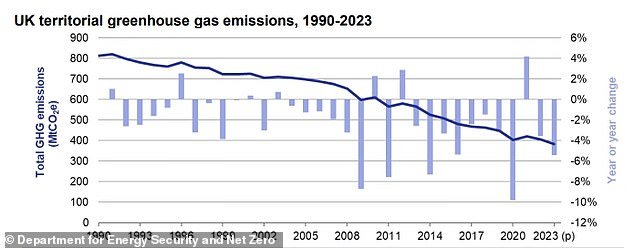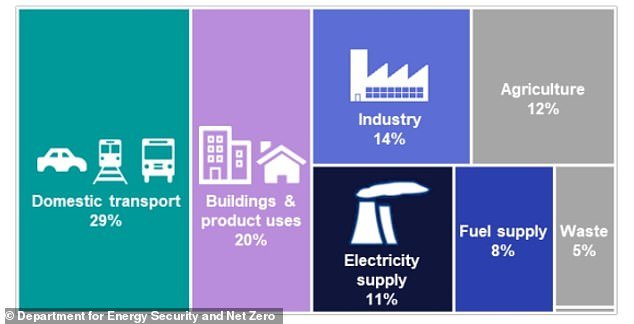Britain’s greenhouse gas emissions fell by 5.4% last year, promising analysis shows
- Emissions fell as Britain used less natural gas due to rising prices
- Since 1990, greenhouse gases in Britain have now fallen by 52.7 percent
Greenhouse gas emissions fell by 5.4 percent last year compared to 2022, as Britain used less natural gas due to rising prices.
Since 1990, greenhouse gases have now fallen by 52.7 percent – as Britain switched from burning coal to gas and renewable energy.
The latest statistics from the Department for Energy Security and Net Zero (Desnz) show that demand for electricity in Britain continues to decline as the country moves away from heavy industry and technologies become more energy efficient.
In addition, Britain imported more electricity last year from France, where around 70 percent of electricity comes from nuclear power, which produces very little greenhouse gases.
It is estimated that Britain has produced 384.2 million tonnes of the gases that cause global warming, up from 406.2 million tonnes previously.
Greenhouse gas emissions fell by 5.4 percent last year compared to 2022 as Britain used less natural gas due to rising prices

Britain is estimated to have produced 384.2 million tonnes of the gases that cause global warming, up from 406.2 million tonnes previously
The total figure bundles gases including carbon dioxide – the largest gas by volume – and methane and other gases used in industry and at home.
Desnz said that “high energy prices were likely a factor in reduced gas use for heating buildings” in 2023, as higher gas prices caused people to turn down the thermostat.
Britain also imported more electricity from France via interconnector cables.
“This contrasts with 2022, when Britain had higher than normal electricity exports and a decline in UK electricity demand, meaning less gas was needed to meet remaining electricity demand,” Desnz said .
Greenhouse gas emissions from electricity supply fell by 10.8 million tonnes – a decline of 19.6 percent in 2023, mainly due to higher imports of electricity from France.
Desnz said the gases contributing to warming from “product use” have also fallen.
These include emissions from home and garden machinery, anesthetics, gases used in air conditioning, refrigeration and aerosols.
Carbon dioxide (CO2) emissions alone fell by 6.6 percent last year, to 302.8 million tons.

Emissions from the industrial sectors fell by 4.6 million tonnes, largely due to lower fuel consumption in the iron and steel industry. There was also a decrease of 1.6 million tonnes (-1.4 percent) in greenhouse gas emissions from domestic transport
“This contrasts with 2022, when Britain had higher than normal electricity exports and a decline in UK electricity demand, meaning less gas was needed to meet remaining electricity demand,” Desnz said .
Emissions from industrial sectors fell by 4.6 million tonnes, largely due to lower fuel consumption in the iron and steel industry.
There was also a decrease of 1.6 million tonnes (-1.4 percent) in greenhouse gas emissions from domestic transport.
However, green groups said the reduction in emissions was still not enough.
Doug Parr, policy director at Greenpeace UK, said: ‘Any reduction in UK emissions is desperately needed, but let’s not fool ourselves into thinking we’re on track to meet our international obligations or statutory carbon budgets by 2030 comply.
‘Emissions from buildings and transport remain stubbornly high and the government does not yet have policies in place to make the cuts needed for the planet or to deliver on our international commitments.
“Sunak needs to get serious about insulation, heat pumps and public transport, and quickly scale up the rollout of renewables and vehicle electrification to get us on the right track.”
Desnz said the latest statistics mean Britain is now more than halfway to net zero.
Energy Security Minister Claire Coutinho said: ‘This latest drop in our emissions follows Britain’s achievement in becoming the first major economy to halve its polluting carbon emissions.
“We did all this while growing our economy by 80% and protecting families from unnecessary costs.”
